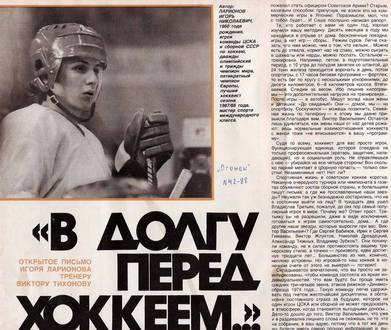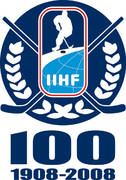Story #65
October 1988 — Moscow, Soviet Union
It was still some seven years before the birth of the internet, so the news traveled slowly. But when the translated story finally hit western sports media, it was a shocker of massive proportions. Igor Larionov, the versatile centre on the first unit of the Soviet Union’s national hockey team, had written an open letter to head coach Viktor Tikhonov in the mass circulation magazine, Ogonyok. The Russian word “Ogonyok” means “small fire”, but what Larionov had set off was more like a bomb.
In a 7,000-word letter which ran over three pages, Larionov harshly criticized coach Tikhonov and the Soviet system under which the players laboured, saying things no one had ever dared to say before. “I published the letter to the coach to open the society’s eyes to what really was being done in this system,” Larionov said several years later when asked about his motives. “I wasn’t doing it for myself - I was doing it for the whole team.”
In the spirit of a newly-open media under head of state Mikhail Gorbachev, criticizing a sports authority shouldn’t have been considered such a novelty, even in 1988. But while Gorbachev’s “Glasnost” (openness) had reached many fields of Soviet life after 1985, the national hockey team was still very much Viktor Tikhonov’s domain over which he maintained strict and overwhelming control. The players literally ate, slept, and trained on his orders. The national team, as well as the club team CSKA Moscow (both coached by Tikhonov) practiced ten or eleven months a year, and team members were required to stay at the training camp (“baza”) for most of the time. While Swedish, Finnish, or Canadian players went home after a game or practice, Larionov and his teammates went back to the “baza” alone, without family or friends or a familiar living room in which to relax.
Larionov, 28 at that time, was fed up with this treatment. He wanted the world to know that while Soviet society was loosening its restrictions, the nation’s hockey heroes were treated according to old-style methods. Among Larionov’s criticisms were the endless hours away from home. “It’s a wonder our wives manage to give birth”, he wrote plainly in the letter. Realizing that his best years would soon be past him, Larionov also wanted one last chance to prove himself in the NHL.
Larionov’s open letter had both immediate and far ranging consequences. Tikhonov cut him from the CSKA team that went to North America for the annual NHL-tour and also from the national team that took part in the traditional Izvestia tournament. Defenseman Vyacheslav Fetisov took sides with Larionov and left the team — another shocking declaration of independent thought — and as the 1989 World Championship in Stockholm, Sweden was approaching, the once unassailable CCCP team was, unthinkably, in disarray.
The Soviet ice hockey authorities realized that the battle was lost. They promised the “rebels” that they would be free to leave for the NHL if they committed to play one last time for the national team in Stockholm. Larionov and Fetisov agreed to this arrangement, and without so much as losing one single point, they swept the tournament in nine games and won the nation’s 21st world title.
A 5-1-win against host Sweden on May 1, 1989, marked the end of an era. This was the last time Larionov suited up for the Soviet national team as he soon after joined the Vancouver Canucks for the upcoming 1988-89 season and spend the next 14 seasons in the NHL. All the others on the famous “Green Unit” - Fetisov, Alexei Kasatonov, Sergei Makarov and Vladimir Krutov - also joined NHL clubs.
No one could have stopped the development toward a free and open team concept that mirrored the changes in Soviet society of the day, but it was Igor Larionov’s courageous act that most certainly sped up the process.
As part of the IIHF's 100th anniversary celebrations, www.IIHF.com is featuring the 100 top international hockey stories from the past century (1908-2008). Starting now and continuing through the 2008 IIHF World Championships in Canada, we will bring you approximately three stories a week counting down from Number 100 to Number 11.
The Final Top 10 Countdown will be one of the highlights of the IIHF's Centennial Gala Evening in Quebec City on May 17, the day prior to the Gold Medal Game of the 2008 World Championship.
These are the criteria for inclusion on this list: First, the story has to have had a considerable influence on international hockey. Second, it has to have had either a major immediate impact or a long-lasting significance on the game. Third, although it doesn't necessarily have to be about top players, the story does have to pertain to the highest level of play, notably Olympics, World Championships, and the like. The story can be about a single moment — a goal, a great save, a referee's call — or about an historic event of longer duration — a game, series, tournament, or rule change.
|
 |
Click here for the 100 Top Stories
|










